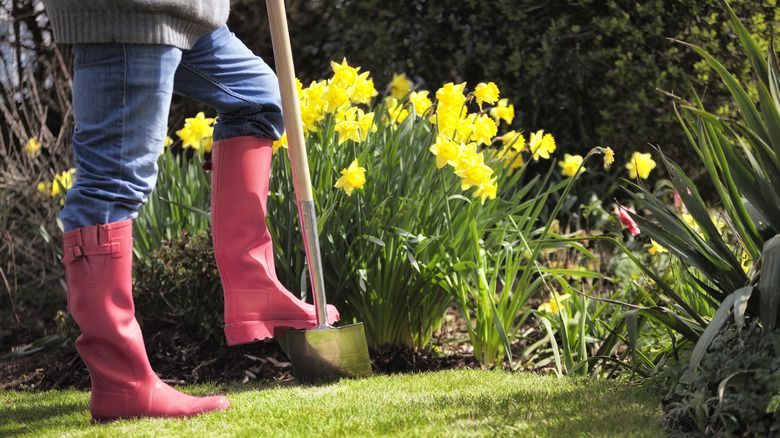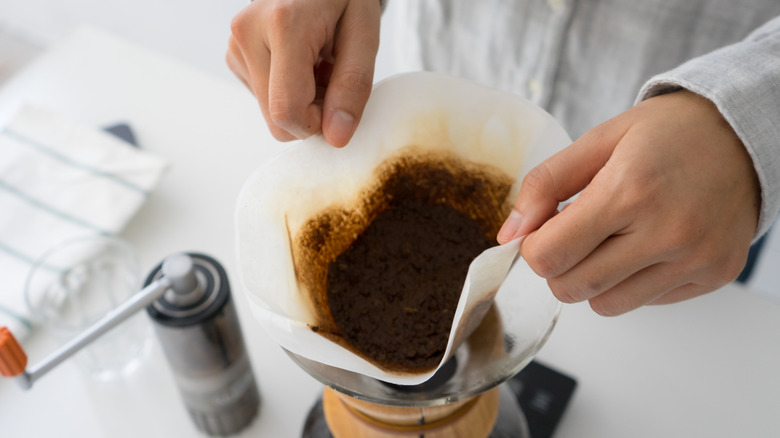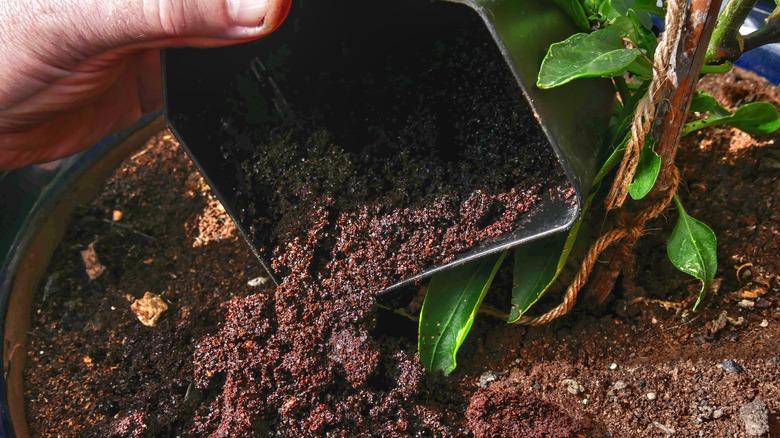The Unexpected Kitchen Scrap That'll Give Your Daffodils A Boost
Coffee grounds, often tossed aside as nothing more than waste, are a gold mine for your garden, particularly when growing daffodils. They offer a green, sustainable way to enrich your soil with essential nutrients. Rich in nitrogen, coffee grounds fuel plants' green, leafy growth, which is crucial during the early stages of development when energy is directed toward establishing a strong vegetative base. This nitrogen boost also plays a vital role in the synthesis of proteins and chlorophyll, contributing to the overall health and vigor of the plant. Alongside nitrogen, coffee grounds supply modest amounts of potassium and phosphorous. These nutrients are essential for the development of flowers and roots, ensuring your daffodils bloom brightly and anchor themselves firmly in the garden.
However, the benefits of using coffee grounds extend beyond mere nutrition. Coffee grounds have a remarkable ability to enhance soil structure. They introduce organic matter into the soil, which improves its texture, making it more friable and easier for daffodil roots to penetrate. This improved structure aids in water retention, ensuring moisture stays within reach of thirsty roots while also improving drainage and preventing waterlogging, which can be detrimental to daffodil health. Additionally, the introduction of coffee grounds encourages the presence of earthworms. These natural tillers of the earth play a crucial role in breaking down organic matter, aerating the soil, and leaving behind worm castings rich in nutrients, further enhancing soil fertility.
The acidic nature of coffee grounds and the soil pH preferences of daffodils
Daffodils flourish in soil that's just the right mix of well-drained and slightly acidic, with a pH of around 6.0 to 7.0. Your daily coffee leftovers could be a boon for these spring beauties. Once you've enjoyed your brew, the spent coffee grounds are not as acidic as fresh, but they still tilt towards a mildly acidic pH of about 6.5 to 6.8. This is where coffee grounds show their true colors as a flexible soil amendment. They're not about drastically changing the soil's pH but fine-tuning it. This gentle nudge towards the acidic side can make a world of difference in how well daffodils access nitrogen—an essential nutrient for their growth and blooming success.
However, although most daffodils prefer neutral to slightly acidic soil, it's fascinating to discover that some varieties are quite content in conditions that lean a bit more towards alkaline. So, before you use the coffee grounds, it's wise to test your soil's current pH level. Knowing the starting point of your soil's acidity can guide how much and how often to add coffee grounds. Soil testing kits are readily available at garden centers and online, offering a simple way to understand your garden's needs. If your soil is already at an ideal pH for daffodils, you might use coffee grounds more sparingly to maintain that balance rather than alter it significantly.
Using coffee grounds with daffodils: dos and don'ts
Using coffee grounds as a fertilizer for your daffodils can be done in several ways. First, you can sprinkle the spent coffee grounds directly onto the soil around your daffodils. Be cautious not to apply too thick of a layer, as coffee grounds can stick together and prevent air and water from reaching the soil. A thin layer mixed into the top few inches of soil can do what is needed without harming your plants.
Perhaps the most popular way to use coffee grounds is by adding them to your compost pile. In the compost, coffee grounds decompose and blend with other organic materials, creating a rich, nutritious compost that can be added to your daffodil beds. This method ensures that nutrients are released slowly, providing a steady supply of nourishment to your plants. Lastly, using coffee grounds with a light mulch around daffodils can help retain soil moisture and suppress weeds.
A critical piece of advice is to avoid using coffee grounds on daffodil seedlings. The caffeine residues found in spent coffee grounds can inhibit germination and slow the growth of young plants. It's best to wait until your daffodils are established before introducing coffee grounds to their environment.


